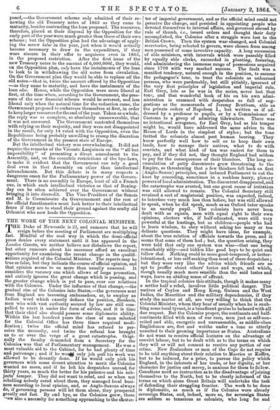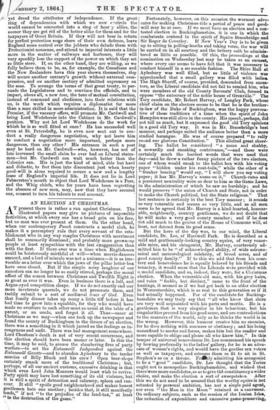THE WORK OF THE NEXT COLONIAL MINISTER.
TiEDuke of Newcastle is ill, and rumours that he will esign before the meeting of Parliament are multiplying fast. Mindful of the cool way in which the demi-official press denies every statement until it has appeared in the London Gazette, we neither believe nor disbelieve the report, but other rumours about his successor afford an excellent opportunity for examining the recent change in the qualifi- 'aliens required of the Colonial Minister. The reports may be true or false, but they indicate the course of official opinion, and that opinion seems to us more than usually unsound. It considers the vacancy one which allows of large promotion, and entirely ignores the great change which is passing, and the greater change which is yet to pass, over our relations with the Colonies. Under the influence of that change,—the gradual rise of the Colonies into States,—the governors sent from England are becoming ambassadors, or, to employ an Indian word which exactly defines the position, Residents, men who with vast authority secured by law are still com- pelled to exert it under the form of advice, and it is time that their chief also should possess some diplomatic ability. Within the last hundred years the class of man selected for the Colonial Office has three times required modi- fication; twice the official mind has refused to per- ceive the necessity, and twice the refusal has brought us to or over the verge of a great catastrophe. Origi- nally the faculty demanded from a Secretary for the Colonies was that of Parliamentary management. He was a most valuable aid to the Cabinet, for he had plenty of time and patronage ; and if he wo only job ivell his work was allowed to be decently done. If he would only pick his governors with some decent attention to merit the Colonies wanted no more, and 'if he left his despatches unread;,-for thirty years, so much the better for his patience and his sub- jects temper. They did not want to rebel, and as when not rebelling nobody cared about them, they managed local busi- ness according to local opinion, and, as Anglo-Saxons always do, if governing persona will let them alone, they prospered greatly and fast. By and bye, as the Colonies grew, there --.ew also a necessity for something approaching to the charac- ter of imperial government, and as the official mind could not perceive the change, and persisted in appointing people who devoted themselves to internal affairs, and governed abroad by rule of thumb, i.e., issued orders and thought their duty accomplished, the Colonies after a struggle were lost to the British Crown. Then the system was• changed, and Colonial secretaries, being selected to govern, were chosen from among men possessed of some inventive capacity. A long succession of able ministers, with intervals which were passably filled by equally able clerks, succeeded in planting, fostering, and administering the immense range of possessions acquired since 1790 with very marked success. The fault was a manifest tendency, natural enough in the position, to assume- the pedagogue's tone, to treat the colonists as unlearned persons, who were pardonably, but still pitiably, ignorant of the very first principles of legislation and imperial rule. Earl Grey, late as he was in the series, never lost. that.
tone, and that wonderful book of his on his own admi- nistration is crammed with despatches as full of sug- gestions as the memoranda of Jeremy Bentham, able as the private orders of Napoleon I., but written as if ad- dressed by a professor to pupils, or by a Commissioner of Customs to a group of admiring tidewaiters. There was no intentional arrogance, for Earl Grey, bad as his temper might be, would have addressed the same advice to the House of Lords in the simplest of styles ; but the tone- fretted the colonists almost past human bearing. They knew perfectly well how to sell or to keep their own lands, how to manage their natives, what to do witty convicts, and what kind of tax was easiest for them to pay, and if they did not, they thought England had seldom to pay for the consequences of their blunders. The long ac- cumulation of petty discontents grew threatening to the Empire, so threatening that a few thinkers fell back on first (Anglo-Saxon) principles, and induced Parliament to cut the knot by conceding, sometimes in a reckless hurry, plenary powers of local administration. The discontent disappeared, and the catastrophe was averted, but one great cause of irritation was still allowed to remain. The Colonial Secretary still retained a sort of magisterial position, was expected, indeed, to interfere very much less than before, but was still allowed to speak, when he did speak, much as an Oxford tutor speaks. to an unruly pupil. The colonists have never been dealt with as equals, men with equal right to their own opinions, electors who, if half-educated, were still very powerful at the hustings, but as children—people who had to learn wisdom, to obey without asking too many or too- delicate questions. They might have ideas, for example, about the true relation of officials towards the press, and it.
seems that some of them had ; but, the question arising, they were told that only one system was wise—that one being remarkably silly—and bidden like good boys to be quiet an& follow that. Nothing could be more good-tempered, or better- intentioned, or less self-seeking than most of these despatches ; but they were very like the advice which friends are so. apt to proffer about others' tastes and ways, and which, though usually much more sensible than the said tastes and ways, leave an abiding sense of affront. In the tropical colonies this attitude, though it makes many a settler half a rebel, involves little political danger. The- natives of Ceylon and Hong Kong, Guiana and the West Indies, the Mauritius and the military dependencies, if they study the matter at all, are very willing to think that the Colonial Minister, whom they hear of usually when he is snub- bing some local tyrant, is a beneficent genius to beheard with all due respect. But the Colonies proper, the continents and half- continents filled with men of our race, men just as self-con- ceited and able, energetic and unreasonable, as middle-class Englishmen are, fret and writhe under a tone so utterly unsuited to their growing importance as States. Australians do not want to receive official lectures on the advantage of convict labour, but to be dealt with as to the terms on which they will or will not consent to receive any portion of our crime. New Zealanders or men of the Cape do not require to be told anything about their relation to Maories or Kaffirs, but to be induced, for a price, to pursue the policy which England, in the interests of her trade, or her dignity, or her character for justice and mercy, is anxious for them to follow. Canadians need no instruction as to the disadvantage of joining themselves to the North, but to be clearly informed of the terms on which alone Great Britain will undertake the task of defending their straggling frontier. The work to be done is diplomatic, as much as if the Colonies were already sovereign States, and, indeed, more so, for sovereign States are seldom so tenacious as colonists; who long for and Ae yet dread the attributes of independence. If the great ring of dependencies with which we now e -circle the world cannot be converted into a ring of hear y allies, the sooner they are got rid of the better alike for them and for the taxpayers of Great Britain. If they will not bear in return for perfect protection some share of their own defence, leave England some control over the jobbers who delude them with Protectionist nonsense, and attend to imperial interests a little more in the matter of railways and harbours, they will very speedily lose the support of the power on which they set so little store. If, on the other hand, they are willing, as we fully believe them to be, as, for example, the Canadians and the New Zealanders have this year shown themselves, they will secure another century's growth without external com- pression, and we another century of admitted supremacy on the seas. To arrange the terms of that great treaty, to per- suade the Legislatures and to convince the officials, and to impart, above all, a new tone, the tone of mutual consultation, instead of command and obedience, into their relations with us, is the work which requires a diplomatist far more than a man skilled in mere administration. It is said that the Premier, if the vacancy offers, will promote Mr. Cardwell and bring Lord Wodehouse into the Cabinet in Mr. Cardwell's position. Why not let Lord Wodehouse do the work for which he is so well fitted at once? He has succeeded well even at St. Petersbu'Fg, he is even now sent out to con- duct a really dangerous negotiation, why not leave him to conduct a negotiation more important, perhaps more dangerous, than any other ? His entrance in such a post may be hard on Mr. Cardwell—who, however, has not of late increased the small claim he ever had on Liberal states- men—but Mr. Cardwell can wait much better than the Colonies can. His is just the kind of mind, able but hard and didactic, to fret them into discontent just when hearty good-will is alone required to secure a new and a lengthy lease of England's imperial life. It does not lie in Lord Palmerston's mouth to object that Lord Wodehouse is a Peer, and the Whig chiefs, who for years have been regretting the absence of new men, may, now that they have secured one, consent to turn his talents to real account.

















































 Previous page
Previous page